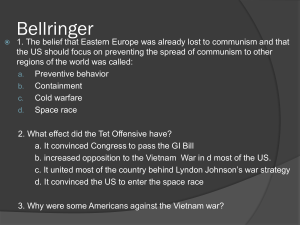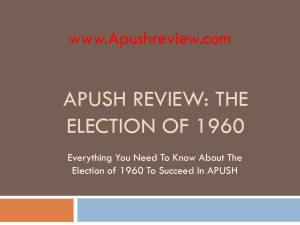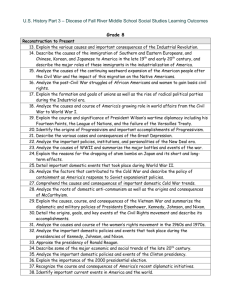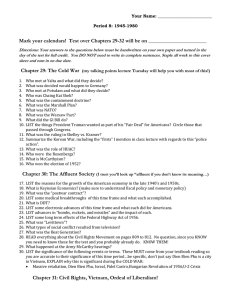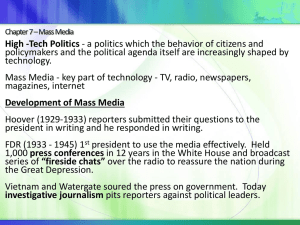-
advertisement
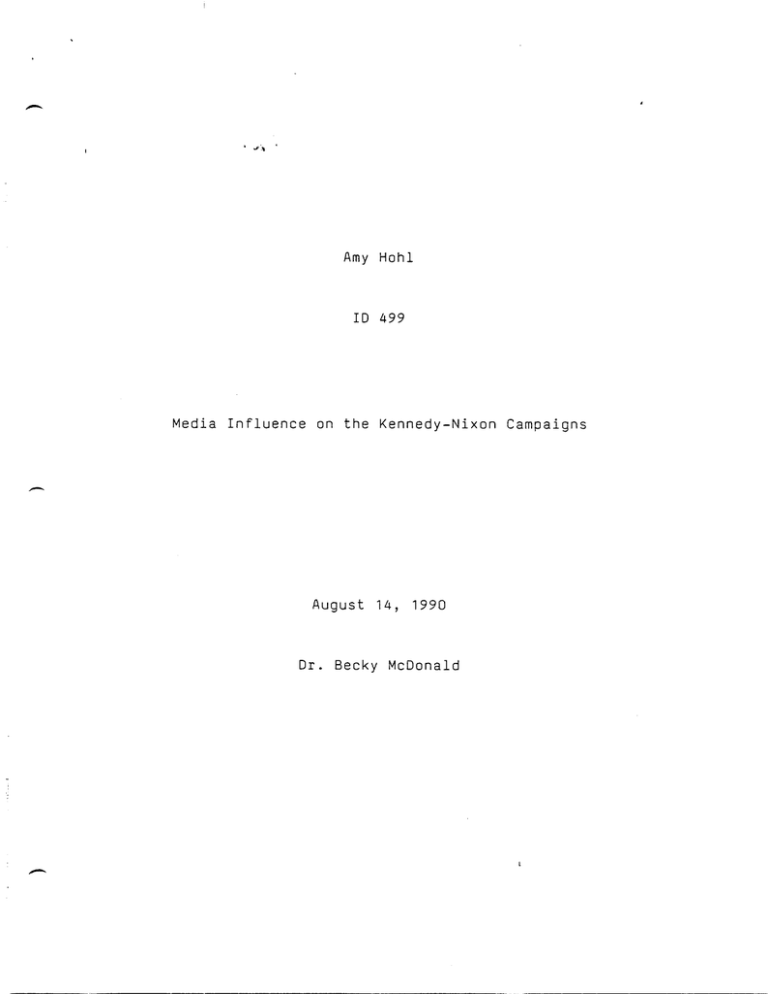
1 J'., • Amy Hohl ID 499 Media Influence on the Kennedy-Nixon Campaigns -. August 14, 1990 Dr. Becky McDonald - -'P , - , .1lC-L~ Media IAflu~nce on the Kennedy-Nixon Campaigns As a double major in journalism and political science, I wanted to incorporate both programs into my honor's thesis. The political science side of me has always been interested in the Kennedy-Nixon campaign. Curiosity about John F. Kennedy-- I have black and white images of him in my mind--has always been fueled by his tragic death at a young age. When I thought about incorporating journalism into this thesis, the natural logic pointed to researching the media's influence in the 1960 presidential campaign--specifically, the influence of - the four debates. As most people of my age who were reared on television and influenced by the images it projects, I assumed that the reason Kennedy won the election was because of his winning the debates. I reasoned that everyone in the 1960s probably relied exclusively on television for their information, as do most people today. Elihu Katz and Jacob J. Feldman state that, in 1952, 31 percent of Americans named television as the major supplier of information; 49 percent in 1956; and 60 percent in 1960(Kraus 193). My argument for this project was going to be that Kennedy won because he had a better television image that Nixon had. this paper has changed my argument. However, researching Kennedy won because of many factors, not just the television debates. ,,- I will discuss television i.mage importance and impacts, other contributing factors and the media influence. At the conclusion of this 2 ~ paper, I will show that television was a strong influence in the campaign, but not the only factor. 1 JI', • First, the image the candidates, Kennedy and Nixon, projected needs to be considered. After viewing a film based on Theodore H. White's book, The Making of the President 1960, I would judge both candidates to have equal appeal to me. The film showed clips from speeches both gave to different audiences. Honestly, I like both of their television images even though they were in black and white. However, judging the best candidate solely on his television image should not be the voter's only criteria. Yet the American public of 1960, with the first televised debates, could weigh the candidate's image equally -- with his stance on the issues. During the debates, voters could see both candidates at the same time and hear their views. I found the effects of television versus radio to be very interesting. As Charles Siepm"ann states, "That TV has distinctive impact, involving differential psychological response, is strongly suggested by the finding that, while both audiences heard the same words, radio listeners to the debate judged the contestants to have scored evenly, while TV viewers judged Kennedy to have won hands down"(Kraus 134). Before researching this topic, I had assumed that Nixon was oblivious to the importance of a good television image. again, I was wrong. Once Richard J. Whalen states, "If diligent application could make a media politician, Nixon should have - been an outstanding success. He closely studied media techniques, fascinated with the small details of how desired effects might 3 ~ be achieved. He was proud of his skill in the mechanics of politics, and especially proud of his skill in using the new • J' "" • image-machine of television ll (51). As I've found, knowing the theories does not necessarily translate into effective use. Simply because I know the structure for a speech does not make me a wonderful orator. instinct of a good actor. Nixon did not possess the To make matters worse, luck was not with him several weeks before going into the first debate on September 26, 1960. .- As Whalen states, Getting out of an automobile in Greensboro, North Carolina, he [Nixon] hit his knee against the door frame. The knee swelled and became infected. Finally he was forced to spend two weeks in Walter Reed Hospital. This fortnight of convalescence left him hopelessly behind in his fifty-state travel schedule, and his staff pleaded that it be cut back, but Nixon refused and plunged into a hectic round of campaigning. As a result, he approached the first television debate, . . . , ten pounds underweight and visibly on the ragged edge of exhaustion. In the hours before air time, Nixon went into seclusion and pored over briefing papers. Kennedy, with a handful of aides, engaged in an informal IIcramll sesssion and flipped through index cards containing likely questions and answers. In midafternoon, he moved the meeting to the roof of his hotel and relaxed in the sunshine, restoring the healthy tan that would contrast so strikingly with Nixon's sickly pallor(55). . Herbert A. Seltz and Richard D. Yoakam quote Nixon's personal television adviser Ted Rogers: IINo TV camera, no make-up man can hide bone weariness, physical fatigue. sick, he had a fever. He was actually Because Nixon did not give viewers the expected performance . . . deliver . . . the predetermined - mental picture of what they expected, they looked around to find out what was the matter . . . he was not the 'fighting commando' of the Republican cause. So for the first time, they were more conscious of his appearance than of what he 4 - he was saying"(Kraus 95). I Seltz and Yoakam add, "Although Frances Arvold, a CBS make-up expert who had been sent out • J"" • from New York to make up the candidates, was on hand, both refused her services. Because of Nixon's heavy beard, Everett Hart, another of his advisers, applied a commercial product, Max Factor 'Lazy Shave,' a pancake cosmetic, to Nixon's face. In the light of later reactions to Mr. Nixon's looks, it is interesting to note that Nixon would have profitted from professional make-up services, while the candidates' representatives were satisfied with his 100ks"(Kraus 85). In his memoirs, Nixon later wrote, "I had concentrated too much on substance and not enough on appearance. I should have remembered that a picture is worth a thousand words"("What it Does Best" 111). Even if Nixon was not focusing completely -on his image, his media advisers had the sole responsibility of The advisers must find the perfect balance. image-m~ing As Thomas ~E. Patterson states, "Ideally the candidate will appear to the television audience as 'pleasant, not abrasive; have a clear, but not too specific, personality; be self-assured, even cocky, but not pretentious; be articulate, but not erudite or glib; be courageous, but also cautious; and appear handsome, but not too pretty.' The consultant's overriding con~ern is with how candidates say what they say, and how they look when they say it. The unabashed purpose is to leave a favorable image with the television audience"(61). - As I watched clips from the first debate, I saw for myself the mistakes Nixon's advisers 5 -' made. Kennedy's dark suit stood out well against the light grey background while Nixon's light grey suit blended in. 1 .,I' '., • If a viewer had never seen Nixon speak before and relied on his television image during the debate as a basis for their opinion of him, then they were misinformed. Unfortunately for Nixon, his image during the debates hurt him. Connected closely to the television image of a candidate is the impact television has on the voter. Many authors credit John Kennedy as being the first politician to effectively use television. As Henry Fairlie states, "He [KennedyJ was the first politician in any nation to realize that television had given politics a new arena. -- He did not teach the activists and militants and demonstrators with whom we are that they must play to the cameras. familiar But he was the first to demonstrate beyond dispute that there was a new stage"(13). Adds another writer: "That was the first election [1960J in which television played a significant role; today the entire campaign is played out on the living room screen. John Kennedy was the first modern politician to circumvent the power of party bosses by winning his nomination with strong showings in the primaries; today primaries are virtually the only route to the nomination"("The Making of the Presidents: 1960-1988" 50). Richard Whalen argues that television has replaced the political parties as voters choose a candidate by his image instead of his party's platform(48). - Charles Siepmann raises the valid point that a candidate's appearance, sex appeal, ease of manner and quick-wit (all parts of a likable television 6 _ image), have "little to do with a man's essential qualificatiClns for the presidency"(Kraus 37). However, in 1960, as in 1990, television gives images which Americans equate as the ideal. When television projects the perfect American as "handsome, active and sexually attractive"(Whalen 37), voters expect candidates to meet those ideals. The perception of the American public in 1960 was that Kennedy met those expectations better than Nixon did. images. And data shows that many voters saw these Katz and Feldman state, " . . . [A] conservative estimate would be that at least 55 percent of the total adult population watched or listened to each of the debates and, altogether, that upwards of 80 percent of the population saw or heard - at least one of the debates. The average debate viewer was in the audience for some 2t hours--that is, for three of the debates"(Kraus 190). In measuring the impact of the television debates, several surveys were conducted and several conclusions drawn. After reading the studies, I am left to conclude for myself that debates were a positive influence for Kennedy. Theordore H. White writes, -- There is finally, the most extensive survey, that conducted for CBS by Dr. Elmo Roper. Sampling across the country, Dr. Roper estimated for CBS that 57 percent of those who voted believed that the TV debates had influenced their decisions. Another 6 percent, or 4,000,000 voters (by this sample) ascribed their final decision on voting to the debates alone. Of these 4,000,000 voters, 26 percent (or 1,000,000) voted for Nixon, and 72 percent (or almost 3,000,000) voted for Kennedy. If these extrapolations are true, then 2,000,000 of the Kennedy margin came from television's impact on the American mind--and since Kennedy won by only 112,000 votes, he was entirely justified in stating on the Monday following election, November 12th: "It was TV more than anything else that turned the tide"(294). 7 I found two tables interesting and have included them. TABLE 13-9. ~·Vff!.0' DO YOU FEEL WON VOTES AS A RESULT OF THE DEBATE?" (by strength ofparty designation .. percentages) Strong Rep. Kennedy's Net Advantagea (No.) Nixon Both, Mixed, Can't Tell Kennedy (24) 12 63 25 13 17 22 Average Rep. (36) 8 67 25 Lean Rep. (18) 11 54 33 Independent (27) 4 77 19 15 Lean Oem. (II) 0 73 27 27 Average Oem. (20) 0 75 25 25 Strong Oem. .Jill 9 54 35 26 Total (159) 7 67 26 19 a. The fact that all seven groups produce a "net advantage" for Kennedy is a result. which would occur by chance less than one time in a hundred if feelings were randomly distributed. A further test of these data was made by assigning arbitrary values of + 1 to feeling that Kennedy won, 0 to mixed, and ·-1 to Nixon. (The mean of this distribution is .19.) We may test the obtained value against the hypothesis that the mean is zero-the result expected if there were no significant deviation in either direction. The obtained value is significant beyond the .001 level. - (Kraus 245). TABLE 11-7. CHANGES IN COMMITMENT OF VIEWERS AND NON-VIEWERSFIRST DEBATE Unchanged SECOND DEBATE THIRD DEBATE FOURTH DEBA TI! NonViewers Viewers NonViewers Viewers NonViewers Viewers NonViewers % % % % % % % % 58 52 67 65 Viewers 66 73 69 70 15 16 16 Change to Kennedy 25 25 17 17 14 Change to Nixon 17 23 18 17 13 16 ..!± 17 +8 +2 -I 0 +1 -I +2 -I Net gain for Kennedy a. Based on special tabulations by ORe (21) of before-and-after interviews with the same individuals. Before and after the first debate, for example, 58% of the viewers indicated precisely the same commitment (on a 9-point scale), while 25% made a change in Kennedy's favor (e.g., from "leaning" to "strongly committed") and 17% changed in favor of Nixon. (Kraus 210) Table 13-9, used by Paul J. Deutschmann, interested me because - it showed that even strong Republicans viewed Kennedy to have won some votes from the debates. I found that unusual because 8 of what Thomas E. Patterson says: biases. "Most Americans have political Most are loyalists in one way or another, whether their loyalty involves partisianship, group factions, or preferred public policies. Not being political eunuchs, they see candidates through their political desires. their biases gains stature. The candidate who shares His image improves. The candidate who opposes the biases loses stature, and his image deteriorates"(65). Therefore, I think that even fewer Republicans should have given Kennedy the advantage. And to stress television's importance, table 11-7 irdicates more viewers changing to Kennedy than did non-viewers. image. Once again, Kennedy's image beat Nixon's Lance Morrow states, In the television debate, the camera was endlessly kind to Kennedy, whose charm passed through the lenses and directly into the American consciousness. Nixon fared badly on the camera. It exaggerated the depth of his eye sockets, picked up the sweat on his upper lip and the shadow of his heavy whiskers. Kennedy had the video sense to address the camera, anel the American people, while Nixon addressed himself to Kennedy, as a pre-video debater would. Some had thought the 43-year-old Democrat a depth less rich-boy dreamboat who missed too many votes in the Senate. His only previous executive experience ended with his PT boat getting sawed in half by a Japanese destroyer. But the first debate established him in the public mind as at least the equal of the two-term Vice President(24). Whalen further adds, "In a few minutes, Nixon all but threw away the hard-won advantage of his eight years in the vice presidency. The audience watching and comparing the two men could not help but be impressed by Kennedy's confidence and force. Kennedy looked like the stereotype of the television hero, while Nixon more nearly resembled the stereotype of the villain"(58). Again and again, I have read where Kennedy 9 "did not necessarily win the debates, but Nixon lost them"(Kraus 287). Every time tre authors refer to Kennedy's image being better • than Nixon's. ..J".\ • Katz and Feldman write, The most elaborate of the several image studies is that of Tannenbaum, in which respondents are asked to choose the attributes of their Ideal President in terms of a set of scales such as weak-strong, agitated-calm, old-young, and the like, and then-before and after the first debate and, once more, following the last debate--they were asked to rate the two candidates in terms of the same scales. The first debate moved the rating of Kennedy, on all twelve scales, in the direction of the Ideal President, the most important shift being on "experiencedinexperienced." Changes in the before and after ratings of Nixon seemed random and inconsistent by comparison. Both men moved away from Ideal by the end of the debates but Nixon moved away more decisively than did Kennedy(Kraus 204). 5ig Mickelson found that Kennedy benefitted in financial contributions after the debates. "The evidence suggested that the appearance in the confrontations had given the Kennedy candidacy an enormous boost. Whether this stemmed from having 'won the debate' or from stimulating new interest in himself and his campaign is still disputed. It is certain, however, that audiences for his personal appearances grew and, following the 5eptembe= 26th campaign, funds were easier to obtain"(207). Another benefit from the debates, as found in a study by Percy H. Tannenbaum, Bradley s. GreenbLCg and Fred R. 5il verman, was that Kennedy attracted some of the "swing vote" of the Independents(Kraus 288). Another factor, besides television, in Kennedy's victory ,- was the influence of the press. Although journalists consider themselves to be objective when reporting to their audience, 10 as humans, total objectivity isn't possible. And when one considers the opposite attitudes of the candidates towards , .... ' '., . the press, the response by the press is understandable. Richard Goodwin, a speech writer for Kennedy, was asked about his relationship with the press: with the press? "In 1960 how friendly were you We were always encouraged to talk to reporters. The press was part of the team, they traveled with you everywhere, and you developed real relationships"("The Making of the Presidents: 1960-1988" 55). Good relations with the press corps probably would not have hurt the Nixon campaign. like the press. Yet, Nixon did not As White states, What happened, I believe, in the press reporting of the campaign of 1960 was that the sense of dignity of these men, their craftsmen's pride in their calling, was abused by Mr. Nixon and his staff--and not by accident, but by decision. The brotherhood of the press was considered by Mr. Nixon and his press staff, not a brotherhood, but a conspiracy, and a hostile conspiracy at that; it was as if he accepted them permanently in their uncomfortable and unpleasant campaign role--as vagabonds(335). Joseph P. Berry paraphrases White and adds, "Nixon's fear that the press distrusted and disliked him became a self-fulfilling prophecy. White calculated that the reporters assigned to Nixon at the beginning of the campaign were probably split 50-50 between those warm and those frosty toward him. By the end of the campaign, nearly all of the press [correspondents] that covered Nixon became antagonistic toward him. The antagonism resulted from the abusive treatment that they received from Nixon and his staff"(51). In a 1988 interview, Herbert Klein, press secretary for Nixon in 1960, recounts his view of the 11 - press: With the charm of Kennedy, or whatever you want to call' it; there was a lot of bias [in the pressJ. It didn't start off even; it started off favoring Kennedy, and I think he did an excellent job of cultivating that. You had a situation where a reporter might sit at a Nixon rally that was going well, but he wouldn't feel quite as good about it, no matter how fairly he was trying to write the story. I've never seen such bias before that election, and I've never seen it since that election. Look at Theordore H. White's book [The Making of the President 1960J, which epitomizes really fine writing and history. He spent most of his time with the Kennedy pool. Then, when Nixon was behind. he came in to try to learn a lot moreabout the insid~.· We had to make the decision [to say noJ: We would work with reporters who would get us votes, not history(IIThe Making of the Presidents: 1960-1988" 51). Even if the ~ress was biased throughout the entire campaign, at least immmediately after the first debate one study found _ no bias in reporting of the debate. Paul J. Deutschmann states, A careful checking of newspapers circulated in the community [Lansing and East LansingJ for the period just following the debate revealed virtually no items with overt answers to the predominant question of who won the debate. The bulk of the items, including editorials and commentaries, said in effect, lilt was a draw." We monitored radio and television coverage, again seeking indications of directionality in the comment and found virtually none. This judgment of the researchers was supported substantially by the judgments of the respondents, 79 percent of whom said they could see no indications in the mass media reports they were exposed to that either Nixon or Kennedy won"(Kraus 236). Because the vote was so close, Berry's comment about the press is applicable: lilt can be generally assumed that Kennedy's relationship with the press did contribute to his ultimate victory over Nixon. - Since the winning margin of the popular vote was so narrow (one-tenth of one percent), every favorable factor for Kennedy looms larger in retrospect"(53). 12 - Finally, I'd like to mention some of the other factors' which ultimately CQntributed to Kennedy's win. .J' ., Kurt and Gladys Engel Lang state, "The closeness of Kennedy's victory shows that to win he needed every single one of the breaks he got. His victory is attributable only to a concatenation of all the factors working in his favor. He needed the votes of Southern Negroes and obtained them apparentlly through his intervention for MattiIT Luther King. The support of New York's liberal Democrats--equally important--was obtained through the efforts of Eleanor Roosevelt, Herbert Lehman, and others in the party's reform wing. Labor's enthusiastic assistance everywhere supplied a crucial balance, and the rise of unemployment - in the fall .undoubtedly helped"(Kraus 313). Kennedy's speech writer, Goodwin, gave his ideas of what the country was facing in the 1960 election: . . [T]here was also a sense of stagnation in the country. This was also true in our foreign relations. China had gone to Communism. Cuba had gone to Communism. Both Kennedy and Nixon came out of a generation of winners. They had won World War II. They were the young men who then helped establish the United States as preeminent in the world both economically and militarily. And there was a sense that we were losing our momentum and forward drive. Kennedy, in a sense, did more to capitalize on the past than Nixon did. He said, we have a great country, but we can be greater("The Making of the Presidents: 1960-1988" 57). The Kennedy campaign was correct to focus on foreign relations. Harrison Hickman, a pollster for Democrats, stated that, in 1960, 54 percent of the American people identified "foreign - policy issues as the most important facing the country"("The Making of the Presidents: 1960-1988" 58). Richard Whalen comments on the mind-set of the public during 1960: 13 Rising individual dissatisfaction among outwardly successful Americans formed the background of the "issue" of national purpose, which was cultural rather th'an' poli tical. Men and women who fel t purpose had seeped out of their lives sought it elsewhere. In this atmosphere of national self-doubt, John Kennedy, more than any other figure, caught the ear and the eye of the new middle class. Though a conventional and traditional politician, he stood within the media culture in which the anxious searched for their self-image. The seeming embodiment of his rhetoric, he offered the reassuring possibility of leroism(38). In a more factual listing, White cites some of the the summer before the election: even~during "From May through June all the following events occurred. - -The U-2 was shot down and our u.s. spokesmen were exposed as false. -President Eisenhower flew to Paris for a summit conference that immediately collapsed; following the collapse, he was denounced by Mr. Khrushchev as a 'hypocrite' and a 'liar.' -Rioting in Turkey shook and nearly wiped out a friendly government. -Student riots in Korea reached a violence so great as to overthrow the government of Syngman Rhee. -Our slowly deteriorating relations with Fidel Castro of Cuba arrived at a permanent and total hostility as the bearded maniac expropriated American interests in Cuba and welcomed the rocket-rattling support of Mr. Khrushchev from the Kremlin"(117). Kennedy was successful in gaining name recognition. He was also popular with different segments of society, as Whalen states, "He appealed to all audiences and ideologies. He turned up in the women's magazine McCall's as both subject and author. The right-wing American Mercury found him 'the perfect politician.' The pro-business u.s. News & World Report took respectful note of his fast start in the race for the - nomination"(44). 14 - In coclusion, Kennedy won because he and his political staff made all the right decisions. , oJ' ','11 Kennedy's good image, • use of the mass media, relations with the press corps and understanding of the Democratic Party all 1960 election. helped to win the Political campaigns are too complicated to be reduced to one item which decided the campaign's fate. My ideas about the campaign were naively simplistic. Kennedy's life (excpet for a little womanizing) has been glamorized, and I had fallen into the trap of believing that his brilliant television personality had won the presidency. I'm glad my assumptions were incorrect. Actually, I'm reassured that Americans, in the 1960s, weren't as hypnotized by television - -- as I was. - WORKS CITED 1 J'" • Berry, Joseph P., Jr. John F. Kennedy and the Media: The First Television President. University Press of America: ~~~---~~~~~--~~~--Marylancl, 1987. Fairlie, Henry. "J.F.K.'s Television Presidency: What the Media Extravaganza Failed to Tell Us." The New Republic, vol. 189, December 26, 1983, pp. 11-13. Kraus, Sidney. ed. The Great Debates. Indiana University Press: United states, 1962. "The Making of the Presidents: 1960-1988." Life, vol. 111, September 1988, pp. 50-58. Mickelson, Sig. The Electric Mirror. Dodd, Mead & Company: New York, 1972. Morrow, Lanc=. "Of Myth and Memory: Dreaming of 1960 in the New World." Time, vol. 132, Octnb"er '24, 1988, pp. 21-25. - Patterson, T.omas E. The Unseeing Eye. G.P. Putnam's Sons: New Yor.<, 1976. Whalen, Richard J. Taking Sides: A Personal View of America from Ke.nedy to Nixon to Kennedy. Houghton Mifflin Company: Boston, 1974. "What it Does Best." Life, vol. 12, March 1989, pp. 102-111. White, Theodore H. The Making of the President 1960. Atheneum Publishers:New York, 1961. -. -- BIBLIOGRAPHY ,,, Am e ric a L0 v edT hiS" Pte sid e n t ." Pe 0 pIe Wee k I y, vol. 20, Nov em b e r 28, 1983, pp. 151-153. Berry, Joseph P., Jr. John F. Kennedy and the Media: The First Television President. University Press of America: Maryland, 1987. Burner, David. John F. Kennedy and a New Genration. Scott, Foresman and Company:Illinois, 1988. Fairlie, Henry. "J.F.K.'s Television Presidency: What the Media Extravaganza Failed to Tell Us." The New Republic, vol. 189, December 26, 1983, pp. 11-13. Kaiser, David E. "The Politician." The New Republic, vol. 189, November 21, 1983, pp. 15-17. Kraus, Sidney. ed .. The Great Debates. Indiana University Press: United States, 1962. Linsky, Martin. Television and the Presidential Elections. D.C. Heath and Company:Massachusetts, 1983. "The Making of the Presidents: 1960-1988." Life, vol. 111, September 1988, pp. 50-58. Mickelson, Sig. The Electric Mirror. Dodd, Mead & Company: New York, 1972. Minow, Newton N. Presidential Television. Basic Books,Inc.: New York, 1973. Morrow, Lance. "Of Myth and Memory; Dreaming of 1960 in the New World." Time, vol. 132, October 24, 1988, pp. 21-25. Patterson, Thomas E. The Unseeing Eye. G.P.Putnam's Sons: New York, 1976. Roche, John F. "Jack & Richard & George & Michael." National Review, vol. 40, September 2, 1988, p. 13. Whalen, Richard J. Taking Sides: A Personal View of America from Kennedy to Nixon to Kennedy. Houghton Mifflin Company: Boston, 1974. "What it Does Best." Life, vol. 12, March 1989, pp. 102-111. White, Theodore H. The Making of the President 1960. Atheneum Publishers:New York, 1961.
